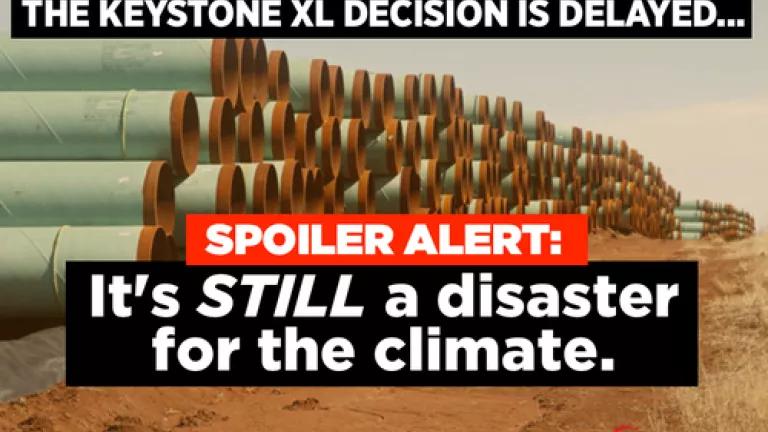
Graphic from Oil Change International
The State Department is providing additional time for comments on the Keystone XL tar sands pipeline, extending the process, until more is known about the project’s route through Nebraska. A Nebraska court had invalidated the state route and it may be months before the court case concludes and a route is in place.
While it makes sense to wait for a Nebraska route, one thing is certain: the impacts of climate change are not waiting. By the time the comment period on Keystone XL gets started again, we can expect to see climate chaos making an even deeper mark in communities in the US and around the world. The Keystone XL pipeline would bring some of the world’s dirtiest oil from under Canada’s Boreal forest to the Gulf Coast where much of it would be exported overseas.
Between the harm that Keystone XL can bring to the landowners and communities along its route and the urgency to tackle climate change, it is clear that the tar sands pipeline is not in the national interest. And this will only become clearer as time goes on.
The State Department’s extension comes at a time of many voices being raised against the Keystone XL tar sands pipeline. The State Department noted that it is still reviewing the unprecedented number of approximately 2.5 million public comments. And recent weeks have seen calls to reject Keystone XL come from business leaders, scientists, and Nobel Laureates.
The “Cowboy and Indian Alliance” is holding an encampment in Washington DC starting April 22 to ask the President to reject Keystone XL and protect communities, lands, waters, climate and health. The fight against Keystone XL brings people together in an effort to protect us all from the harm that our continued reliance on ever dirtier forms of oil brings.
Keystone XL remains a major threat to our climate. This pipeline as the first major conduit for tar sands to overseas markets is critical for expansion of this carbon-intensive industry. And without Keystone XL, tar sands development is not the inevitability that industry would have us believe. Other tar sands transportation projects are coming under the same public scrutiny as Keystone XL and industry itself has repeatedly acknowledged this – supporting the very reason that makes Keystone XL so dangerous for our climate.
And climate change is the urgent issue of our time. This will be even clearer in the coming months as we anticipate the additional warming effects of this year’s likely El Nino event. Climate change is reshaping our world, and the science is telling us in every way possible that we can expect more extreme weather disasters going forward, unless we do something about this now.
Every day without Keystone XL driving expansion of tar sands is good for the climate. And as the Administration continues to assess the project, it should continue to consider new information not only about the route, but also about the impacts that the Keystone XL tar sands pipeline would have in worsening climate change.

